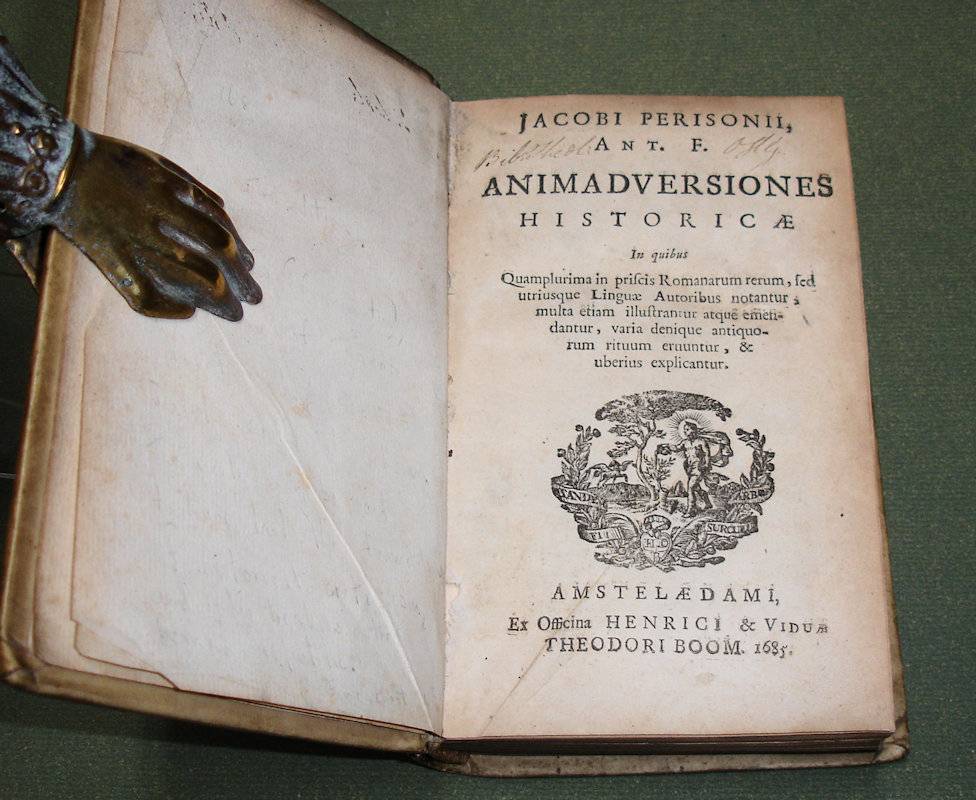PERIZONIUS,J.
Jacobi Perisonii, Ant. F. Animadversiones historicae, in quibus quamplurima in priscis Romanarum rerum, sed utriusque Linguae autoribus notantur, multa etiam illustrantur atque emendantur, varia denique antiquorum rituum eruunter, & uberius explicantur.
Amsterdam (Amstelaedami), Ex officina Henrici & Viduae Theodori Boom, 1685.
8vo. (XXXII),470,(16 index),(2 blank) p. Vellum 16.5 cm
A masterpiece of historical criticism. (Sandys) (
Details: Woodcut printer's mark on the title, it depicts a gardener who waters a shoot that arises from a tree (Boom is Dutch for tree); the motto reads: 'Tandem fit surculus arbor', (A shoot at length becomes a tree) a popular motto in the Netherlands ever since the war of independence against the Spaniards, which lasted 80-years) (
Condition: The spine was problably once exposed to a fire, it is blackish, and the gilt is almost invisible; part of the shield pasted on the spine. Head of the spine is gone. Both boards age-toned and somewhat soiled. Faint ownership entry on the title. Title slightly soiled. Paper slightly yellowing) (
Note: The historian of classical scholarship J.E. Sandys observes that this collections of 'Animadversiones' of Jacobus Perizonius is recognised as a masterpiece of historical criticism, and as an anticipation of Niebuhr's method of dealing with the early history of Rome. (J.E. Sandys, 'A history of classical scholarship', New York 1964, volume 2, p. 331) Jacob Perizonius, 1651-1715, is the Grecian form of the Dutch name Voorbroek. He was from 1682 professor of History at the University of Franeker, and from 1693 of Leiden. His 'Animadversiones historicae' of 1685 made his name. The basic principle of Perizonius is simply that human knowledge is limited and liable to error. This idea he applies to ancient authors. Scribes of later centuries are not always to be blamed for the mistakes and contradictions in the surviving texts, he argues. In this way Perizonius unmasks the ancient authors, and demystifies their 'sacrosanctity'. 'Homines fuerunt veteres illi', the ancients were humans after all, who erred and made mistakes; and consequently they are open to criticism. Ancient historians like Livy, Sueton, Florus, Plutarch et alii, he states, regularly mix up names, confuse dates and make all kind of errors. Their works do not offer indisputable thruths, as many contemporaries thought. The task of the critic is to purge the ancient texts of mistakes. The principle aim of Perizonius is not to bowdlerize the style and expurgate the language, but to investigate the historic contents of the texts. He tries to reconstruct Roman history, investigating with a critical eye the historical data which have come down to us. The fallability of ancient historians was proven already by earlier generations of scholars, that is true, but historical truth can only be attained with a critical research methodology, shifting through evidence and comparing the facts which passed down through the centuries. Perizonius's 'Animadversiones historicae' laid the foundations of historical criticism in modern time) (
Provenance: On the front flyleaf: 'Bib. Theol. Ohly') (
Collation: *-2*8; A-Z8, Aa-Gg8, Hh4 (leaf Hh4 blank)) (Photographs on request)
Book number: 120118 Euro 160.00
Keywords: (Oude Druk), (Rare Books), Historiographie, Roman history, alte Geschichte, ancient history, antike altertum antiquity, catbiografie, historiography, römische Geschichte
 PERIZONIUS,J.
PERIZONIUS,J.